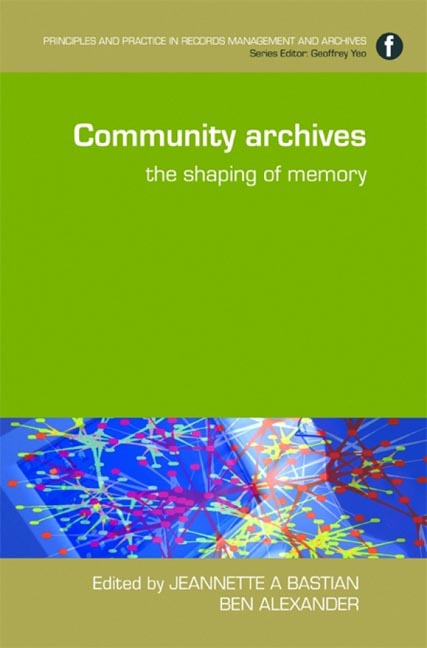Book contents
- Frontmatter
- Contents
- Introduction to the series
- Acknowledgements
- Contributors
- Introduction: Communities and archives – a symbiotic relationship
- Part 1 A community archives model
- 1 ‘It is noh mistri, wi mekin histri.’ Telling our own story: independent and community archives in the UK, challenging and subverting the mainstream
- 2 Special, local and about us: the development of community archives in Britain
- Part 2 Communities and non-traditional record keeping
- Part 3 Records loss, destruction and recovery
- Part 4 Online communities: how technology brings communities and their records together
- Part 5 Building a community archive
- Conclusion: The archivist and community
- Bibliography
- Index
- Miscellaneous Endmatter
- Miscellaneous Endmatter
- Miscellaneous Endmatter
1 - ‘It is noh mistri, wi mekin histri.’ Telling our own story: independent and community archives in the UK, challenging and subverting the mainstream
from Part 1 - A community archives model
Published online by Cambridge University Press: 08 June 2018
- Frontmatter
- Contents
- Introduction to the series
- Acknowledgements
- Contributors
- Introduction: Communities and archives – a symbiotic relationship
- Part 1 A community archives model
- 1 ‘It is noh mistri, wi mekin histri.’ Telling our own story: independent and community archives in the UK, challenging and subverting the mainstream
- 2 Special, local and about us: the development of community archives in Britain
- Part 2 Communities and non-traditional record keeping
- Part 3 Records loss, destruction and recovery
- Part 4 Online communities: how technology brings communities and their records together
- Part 5 Building a community archive
- Conclusion: The archivist and community
- Bibliography
- Index
- Miscellaneous Endmatter
- Miscellaneous Endmatter
- Miscellaneous Endmatter
Summary
And it is that history that I want to retrieve – the history that we made in this country, the history that Claudia Jones inspired. The history of us as black settlers, not coloured immigrants, the history that black workers contributed to the workingclass struggle, which has been ignored by white historians, the history of the struggles of black women to overcome the particular racisms visited upon them … the history of black youth rebellion … It is that history I want to talk about …
Sivanandan, 2004… the strongest reason for creating the archives was to end the silence of patriarchal history about us – women who loved women … we wanted our story to be told by us, shared by us and preserved by us. Nestle, 1990, 87
Introduction
As the quotations opening this chapter suggest, the act of recovering, telling and then preserving one's own history is not merely one of intellectual vanity; nor can it be dismissed – as some still seek to do – as a mildly diverting leisure activity with some socially desirable outcomes. Instead the endeavour by individuals and social groups to document their history, particularly if that history has been generally subordinated or marginalized, is political and subversive. These ‘recast’ histories and their making challenge and seek to undermine both the distortions and omissions of orthodox historical narratives, as well as the archive and heritage collections that sustain them (Hall, 2005, 28). Archivists and others concerned with exploring archives and their power are beginning to examine the significance that engaging with archival materials – and the history created from them – can have for individuals. Rather less has been written, in the UK at least, on the impact that creating archives and ‘making histories’ can have on the development of subversive and counter-hegemonic social or public memories (Johnston, 2001; Flinn, 2007; Hopkins, 2008).
This chapter seeks to add to the literature by examining independent community archives as social movements (or as elements of social movements) and by identifying individuals involved in community archives as political and cultural activists campaigning for equality and cultural recognition and against racism and discrimination.
- Type
- Chapter
- Information
- Community ArchivesThe shaping of memory, pp. 3 - 28Publisher: FacetPrint publication year: 2009
- 29
- Cited by



